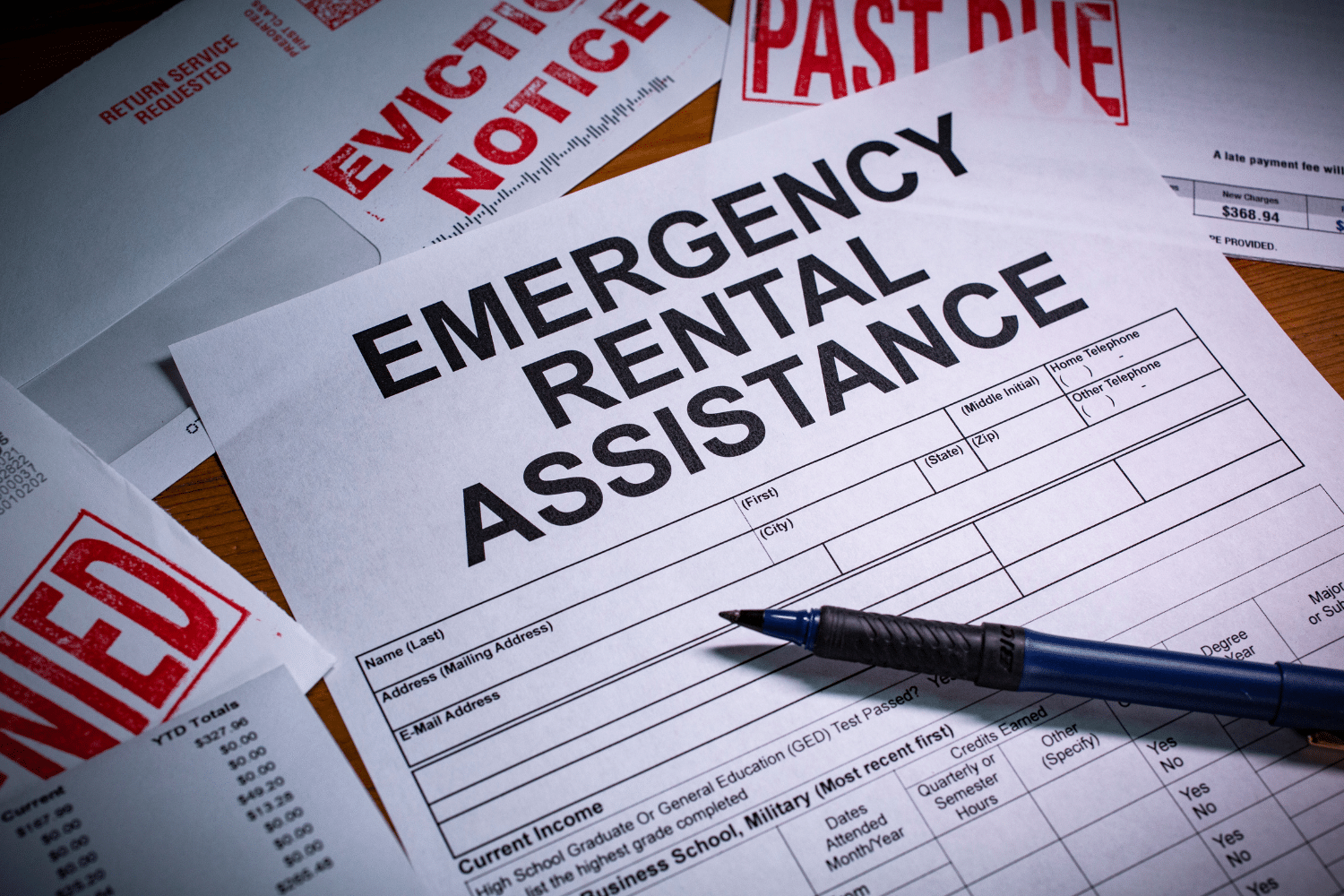Lost your job? Understanding unemployment benefits can help you get financial support quickly. In this guide, learn how to apply, determine eligibility, and calculate your benefits. We also cover maintaining health coverage, protecting yourself from scams, and handling claim denials.
Key Takeaways
- Unemployment benefits applications must follow state-specific procedures, with online applications being the most efficient method.
- Eligibility for benefits generally requires being unemployed for reasons beyond one’s control, with a detailed employment history needed for assessment.
- Claimants should stay vigilant against identity theft and scams while navigating their unemployment claims, ensuring they only use legitimate state resources.
Applying for Unemployment Benefits

Begin by selecting the state where you worked, as each state administers its own unemployment insurance program. Find the appropriate website link or phone number for your state to ensure you follow the correct procedures and access the relevant information.
Applying online is the quickest and most efficient method, available 24/7 for your convenience. It’s best to use a computer instead of a mobile device, as the system is often not optimized for mobile use. This can help avoid technical issues and streamline your application.
Eligibility requirements are detailed on individual state websites. These pages offer guidance on what is needed to complete your application. Reviewing this information beforehand ensures you have all necessary documents and details ready, making the application process smoother.
Determining Eligibility for Unemployment Benefits
Eligibility criteria for unemployment benefits and unemployment compensation vary by state, governed by both federal guidelines and state-specific laws. Understanding the general criteria that most states follow helps navigate this complex landscape.
Individuals must be unemployed for reasons beyond their control. This typically includes layoffs or company closures but excludes voluntary resignations or dismissals for misconduct. You must provide a detailed account of your employment history, as this information determines your eligibility.
Applicants must show they worked for a significant portion of a defined base period, usually the last four to five quarters. If you don’t meet the required work hours or earnings in the regular base year, some states offer an alternate base year to qualify. If you’re unsure about eligibility, apply anyway, as the unemployment agency will make the final determination.
Calculating Your Weekly Benefits

To calculate your weekly benefits, understand how your state’s unemployment insurance program determines the amount. In many states, benefits are calculated as a percentage of your earnings over a recent 52-week period, reflecting your recent work history and income.
For example, in Washington state, the weekly benefit amount is calculated as 3.85% of the average earnings from the highest two quarters of the base period. To compute this, sum the gross wages from the two highest quarters of your base year and divide that total by two. Then, multiply the result by 0.0385 to estimate your weekly benefit amount, subject to a maximum of $1,079 and a minimum of $342. Each state has its own formulas and limits, so it’s essential to refer to your state’s specific guidelines.
After applying, you will be notified about the approval status and the amount you will receive benefits. To continue receiving unemployment benefits, claimants must submit a weekly claim, confirming they are still unemployed and actively seeking work. Many states offer online calculators to estimate your weekly benefits before applying.
Maintaining Health Coverage After Job Loss

Job loss often results in losing employer-sponsored health coverage. The Consolidated Omnibus Budget Reconciliation Act (COBRA) allows continuation of your health plan for up to 18 months after job loss, providing a crucial safety net to ensure you don’t suddenly find yourself without health insurance.
Under COBRA, you retain your existing health coverage but must pay the full premium, including both your previous portion and your employer’s contribution. This can be a significant financial burden, but it ensures continuity of care and avoids the complications of finding new insurance during unemployment.
Protecting Yourself from Identity Theft and Scams
Protecting yourself from identity theft and scams is crucial, especially when dealing with unemployment benefits. Be wary of unsolicited notices about benefits, particularly if you didn’t apply for them. Scammers often exploit these situations, leading to significant financial and personal information loss.
Never disclose sensitive information like your Social Security number or bank details to unknown sources. Scammers can use this to steal your identity and access your money. Always verify you are using the legitimate website or contact information of your state’s unemployment agency to safeguard your information.
Staying vigilant and informed protects you from malicious activities. Following these precautions allows you to focus on securing the benefits you need without the added stress of potential scams.
What to Do If Your Claim Is Denied
A denial notice for your unemployment claim can be disheartening, but it is not the end of the road. If denied, you have the right to appeal within the time frame set by your state, typically 30 days, by writing a letter to the Employment Security Department (ESD).
During the appeals process, continue filing weekly claims to remain eligible for benefits if the appeal is successful. The Office of Administrative Hearings (OAH) will schedule a hearing where both you and your employer can present your cases. Prepare for this hearing with relevant documentation and witnesses to strengthen your argument.
In some instances, claims are denied due to overpayments that were not your fault, and you can request a waiver from the Employment Security Department. After the hearing, you should receive the judge’s decision within a few days. If it takes longer than a week, follow up proactively. If you still disagree with the decision, file a Petition for Review to the Commissioner of the Employment Security Department within 30 days.
Additional Support Services for the Unemployed

Beyond unemployment benefits, various support services can assist during your job search. Job search assistance programs offer support in finding employment, including resume writing services, job placement assistance, and access to job boards. Utilizing these resources can significantly improve your chances of finding new employment quickly.
Training programs are another excellent resource. They often include vocational training, workshops, and courses designed to develop new skills in demand in the job market. Enhancing your skill set increases your employability and opens doors to new career opportunities.
Financial aid options are available to support individuals while they search for new employment, including unemployment benefits, food assistance programs, and help with health coverage. Leveraging these resources can alleviate financial stress and help you focus on securing stable employment.
Exploring and utilizing these additional support services can ease the transition period and facilitate a smoother return to the workforce.
Summary
Navigating the unemployment benefits system can be daunting, but understanding the processes and resources available can provide significant relief. From applying for benefits and determining eligibility to calculating your weekly benefits and maintaining health coverage, each step is crucial. Additionally, knowing how to protect yourself from scams, handle a denied claim, and access additional support services can make a substantial difference in your journey.
Remember, this is a temporary phase, and with the right information and resources, you can effectively manage this period and transition back into the workforce. Stay informed, stay vigilant, and take advantage of the support available to you.
Frequently Asked Questions
To apply for unemployment benefits, select your state and visit the relevant state website or contact the designated phone number for specific application instructions.
Eligibility for unemployment benefits is determined by state regulations, typically requiring you to be unemployed through no fault of your own and to have a sufficient work history.
Weekly benefits are calculated as a percentage of your earnings over the most recent 52-week period, and this calculation can vary based on state regulations. It is important to check your state’s specific guidelines for precise calculations.
You can maintain health coverage after job loss by using COBRA, which allows you to continue your employer-sponsored plan for up to 18 months by paying the full premium. This option can be crucial for ensuring ongoing health care during your transition.
If your unemployment claim is denied, you should appeal the decision by following your state’s specific appeal process, while continuing to file weekly claims.








